This post may contain affiliate links. Please read our disclosure policy.
Make the ultimate simple homemade chili sauce at home with just 4 ingredients, a few minutes, and tons of ways to customize! This red chilli sauce is perfect for spreading over sandwiches, wraps, burgers, and more! Vegan, sugar-free, gluten-free, and can be made oil-free!
For anyone looking to add that little extra spice to their food, chili is the way to go. Whether you’re using chili oil, chili flakes, chili paste, or this simple homemade chili sauce (aka red chilli sauce), there are tons of ways to embrace the heat!
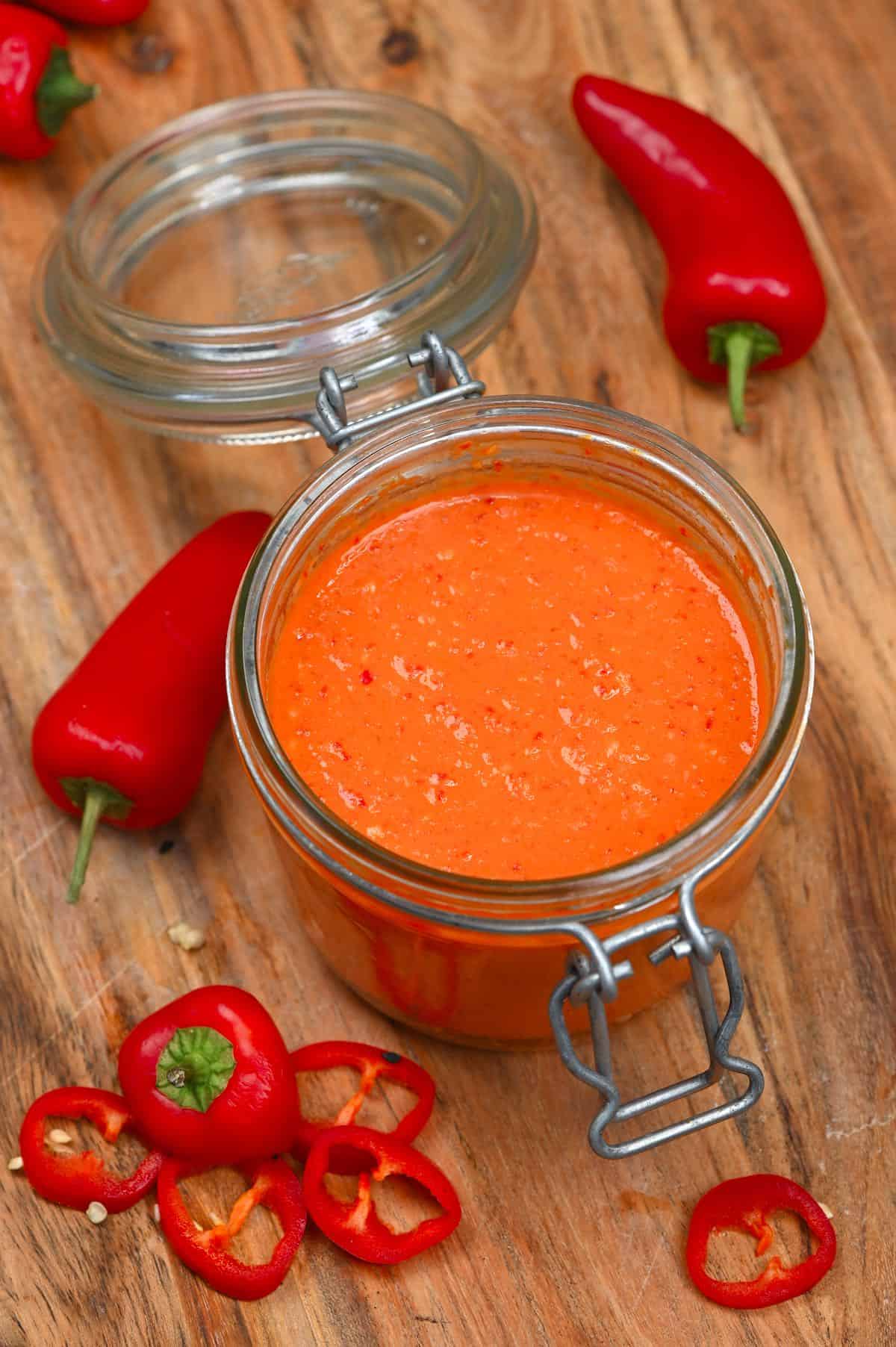
While many store-bought hot chili sauce options are packed with tons of ingredients and preservatives, this simple homemade chili sauce recipe is the ultimate base with just four simple ingredients and tons of ways to adapt it, if preferred.
This recipe actually came about as a happy accident. In all of my DIY’ing this year, I spend a LOT of time ‘troubleshooting’ and experimenting in the kitchen. When working on my homemade chili paste (coming soon!), I ended up with something similar to this recipe; too thin to be considered a paste, but still 100% worthy of adding to tons of dishes – welcome this delicious sauce!
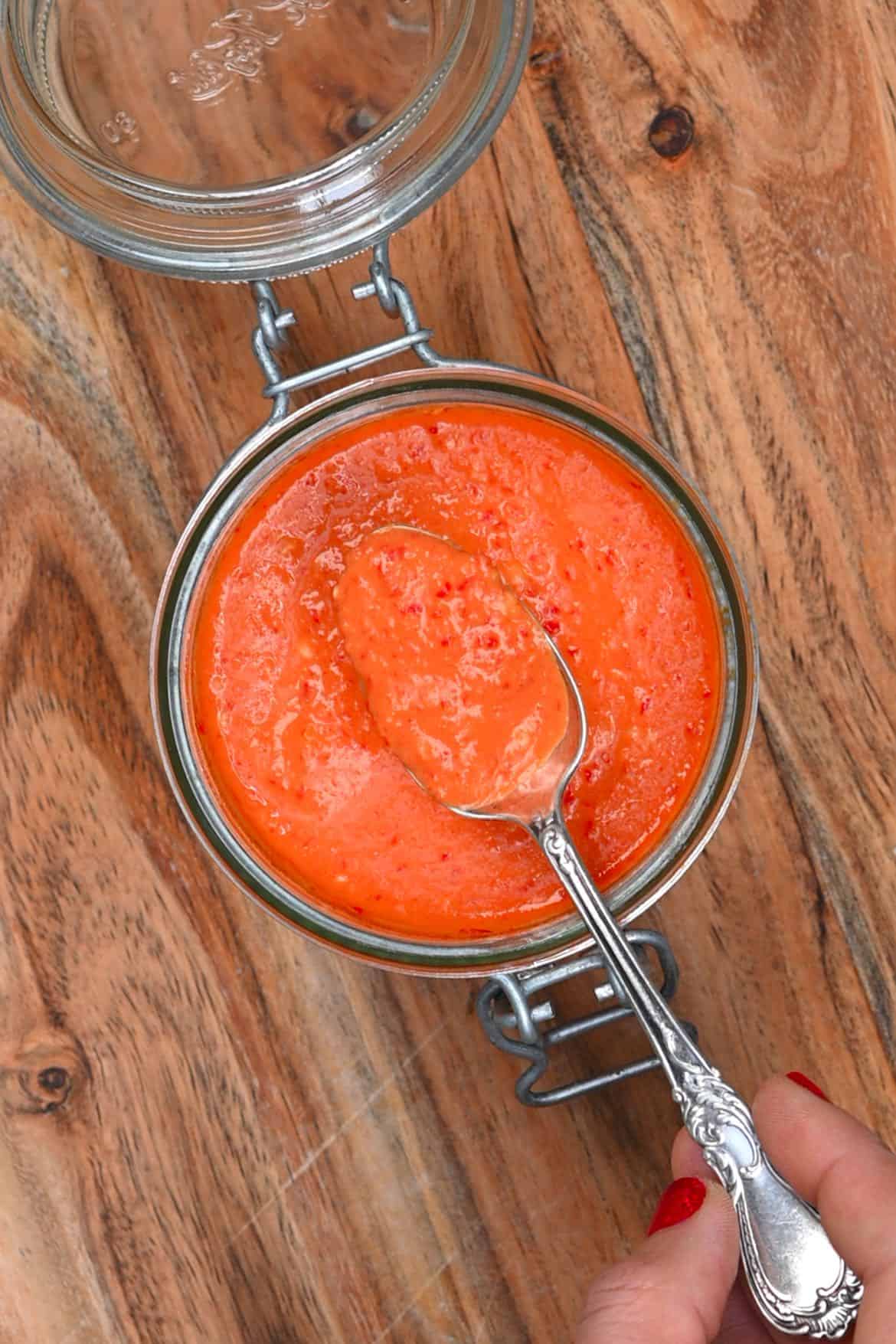
While even homemade chili sauce recipes can be packed with sugars and extra ingredients (i.e., seasonings) – this version is truly a versatile base. It can be enjoyed as-is or adapted with additional flavorings.
Depending on how much spice you like, you can easily mix and match different chilies to get the perfect option for you too. That way, you’ll be slathering it over foods like wraps, burgers, pita, and drizzling it over everything!
Plus, you can check out my Ingredients and recipe notes sections for ways to adapt it to your liking with extra flavorings, natural sweetening, thickness, and more!
Want to save this recipe?
The Ingredients
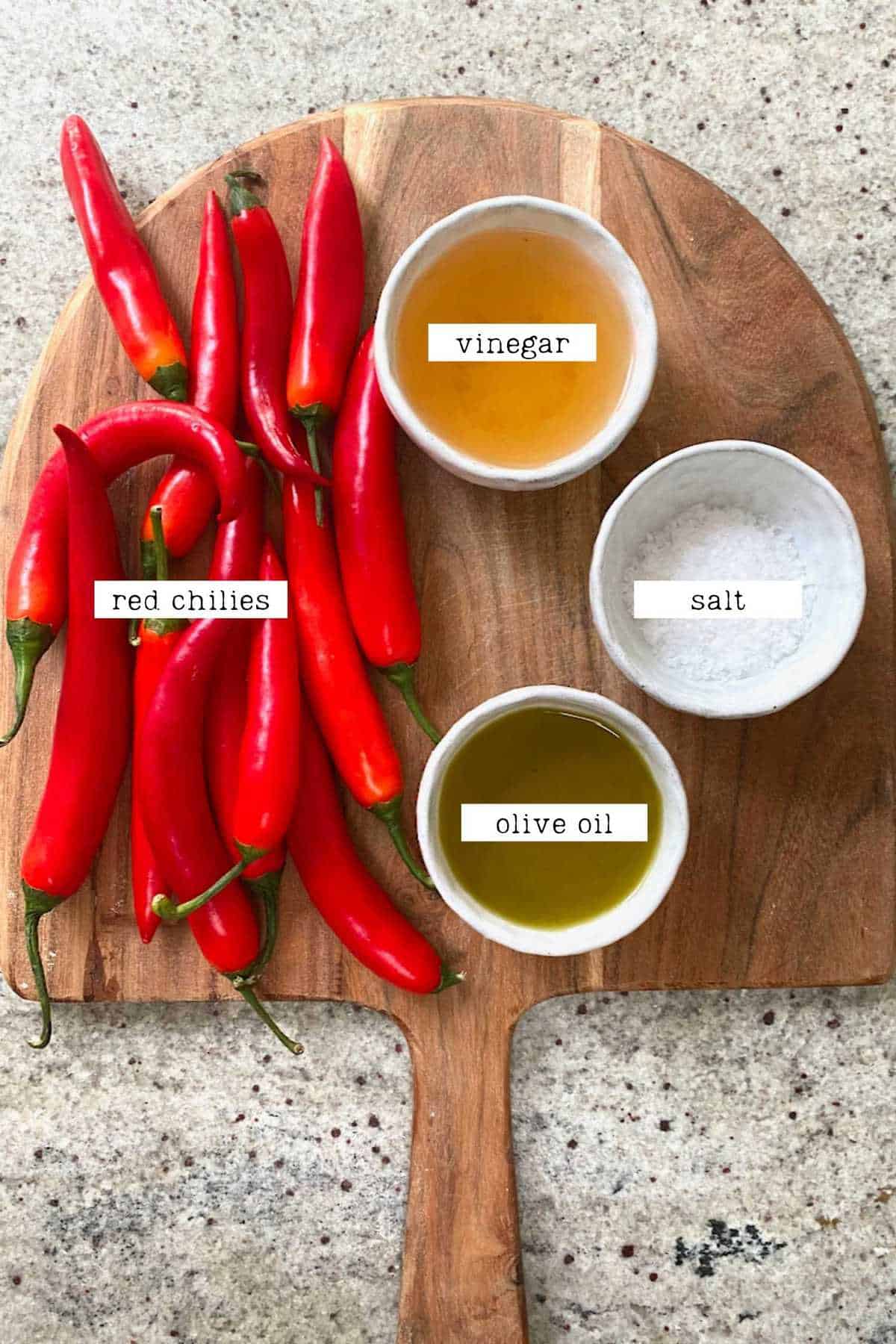
- Red Chili Peppers: Choose the peppers you’d like to use based on how spicy you want your homemade chili sauce to be. Check the quick chart below for a quick guide on choosing your chilies depending on if you want a mild, medium, or hot chili sauce.
- Olive Oil: creates a lovely silky mouth-feel and helps the ingredients to blend. It can be omitted and replaced with a little water if preferred. You could also use another neutral oil like avocado oil, etc.
- Salt: to season
- Vinegar: Acts as a natural preservative to stop the oxidization process. However, it also adds a touch of flavor too. I use homemade apple cider vinegar for its’ slight sweetness.
- (Optional) Sweetener: This is a very popular addition to most chili sauce recipes to cut through the vinegar and chilies’ acidity and spice. Feel free to use the sweetener of your choice; granulated sugar (such as raw sugar, brown, etc.), a natural syrup, or even a sugar-free option like erythritol or swerve.
How To Choose The Peppers Based On Heat
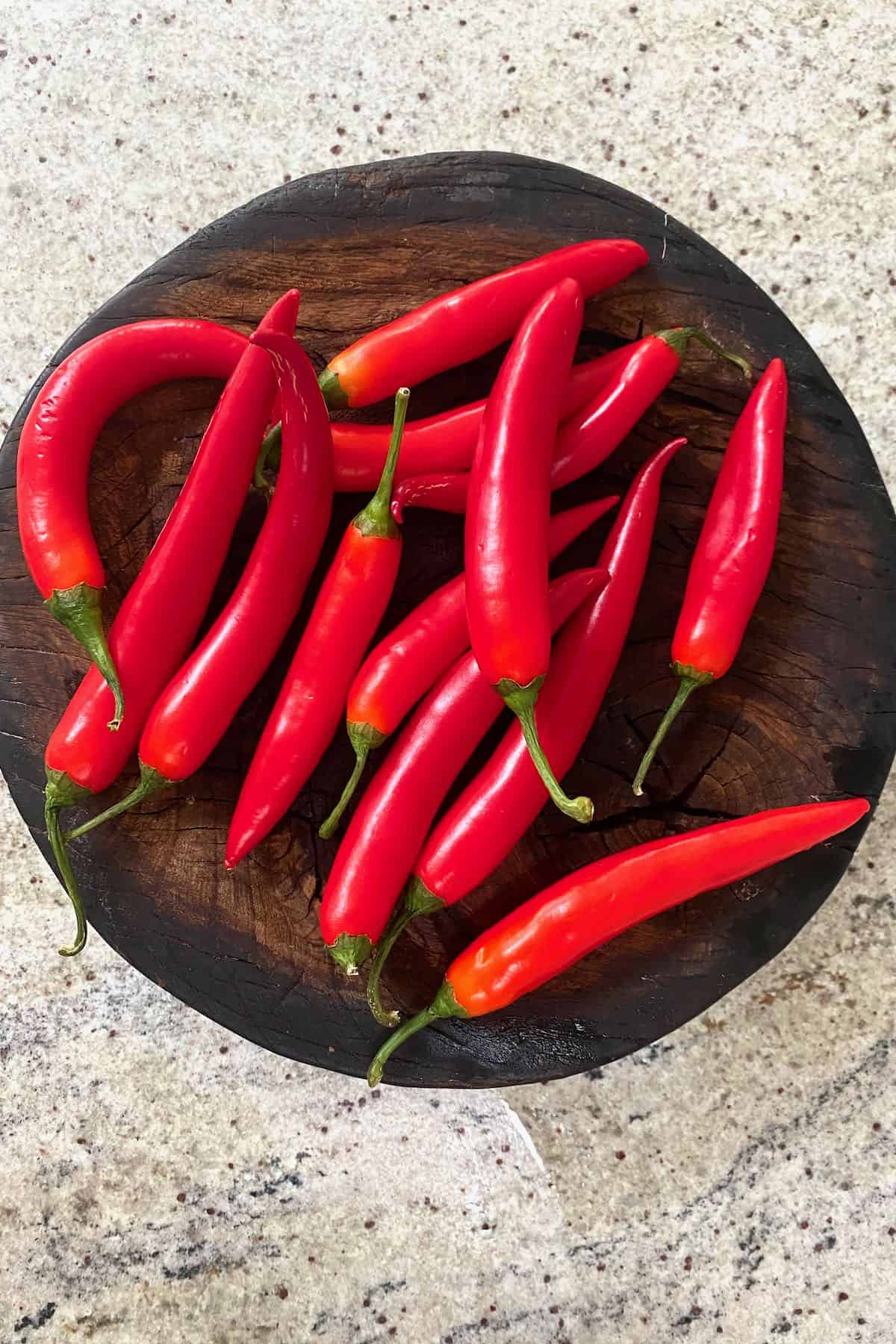
- Mild: Bell pepper (no heat), Friggitello, Anaheim
- Medium: Poblano, Guajillo
- Hot: Jalapeno, Chipotle, Serrano, Cayenne peppers
- Very Hot: Thai chili (also called Bird’s eye), Scotch Bonnet, Habanero
- SUPER Hot: Ghost pepper, Scorpion pepper.
You can also easily mix and match the peppers you use across several levels of heat.
Option Add-ins
Red chili sauce is perfect for customizing with several additions. Here are just a few of my favorite options. I haven’t included amounts as I think this is entirely down to personal taste, and you can add less/more based on your personal flavor preferences.
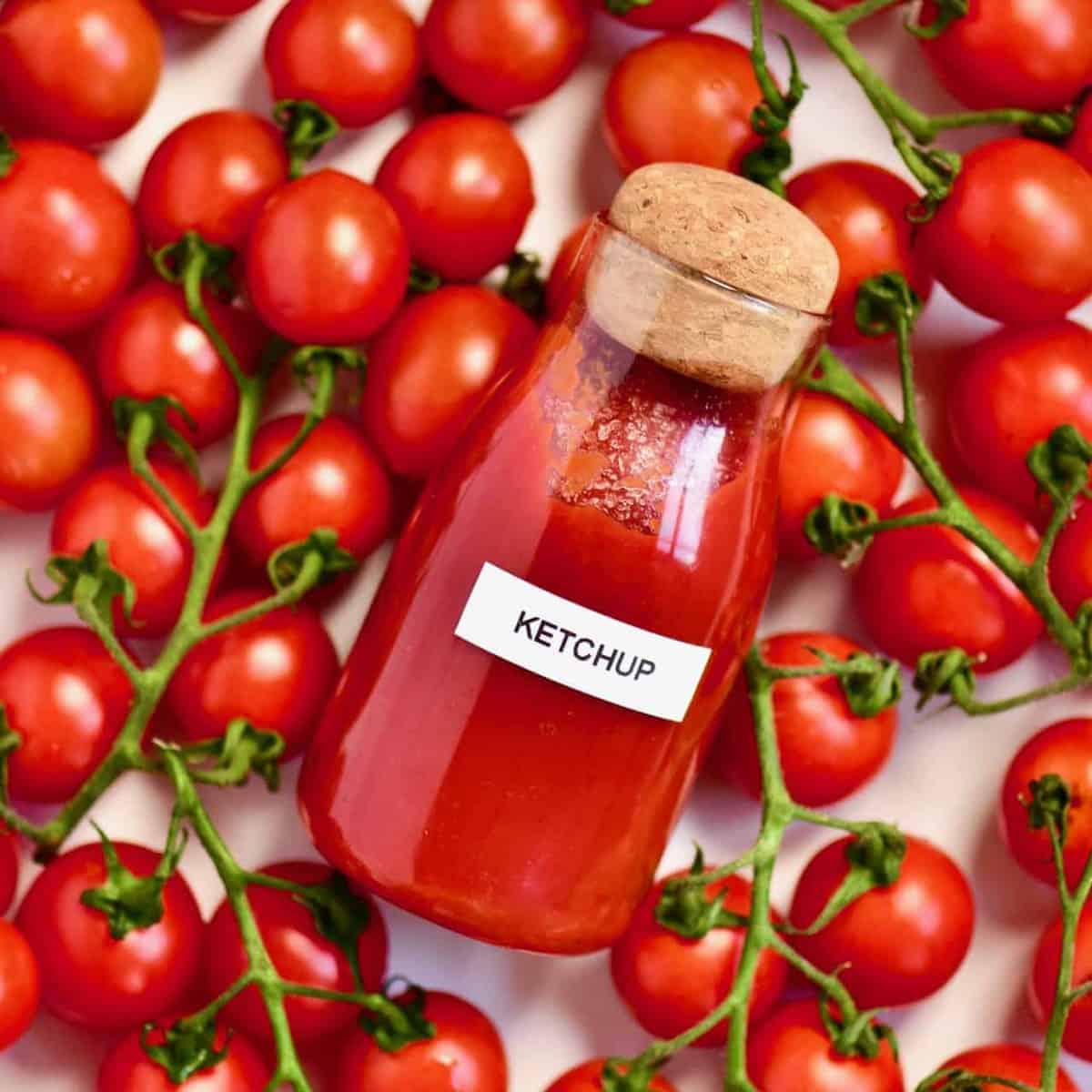
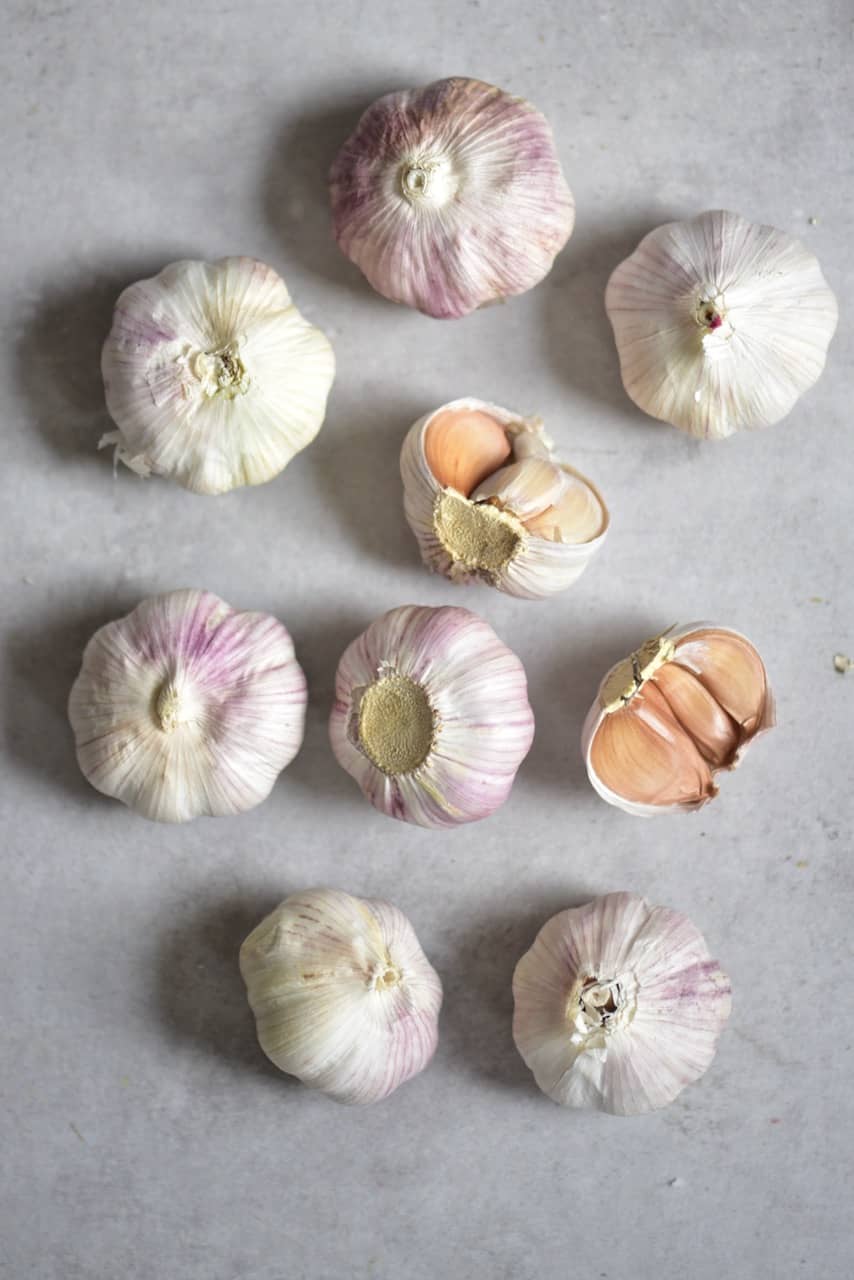
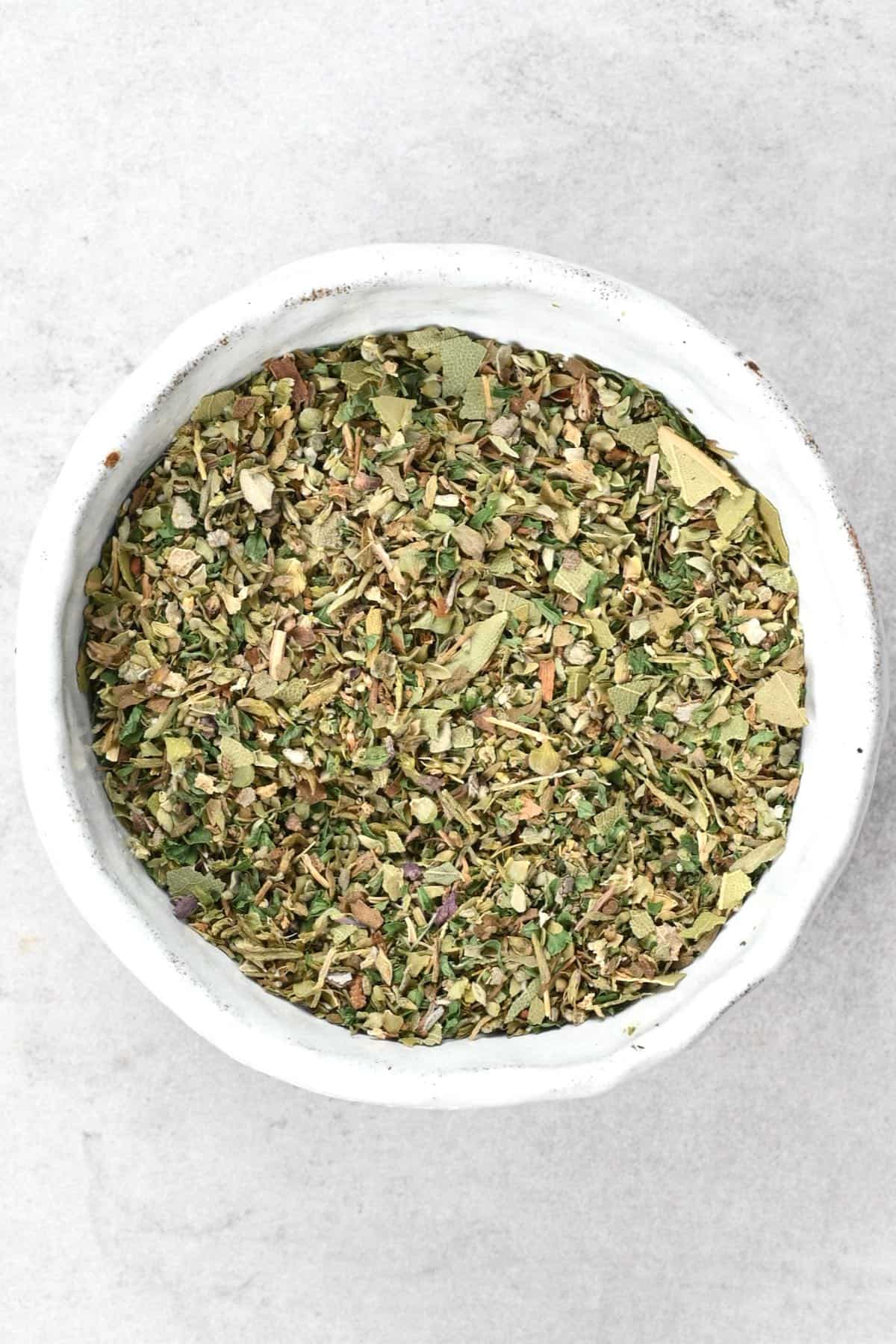
- Tomatoes: You can use different tomato products based on the end texture and flavor you’d like to achieve. Canned (or fresh) chopped tomatoes will lead to an even thinner red chili sauce. You could use tomato puree/paste for a more concentrated flavor and a similar texture to the original sauce. You can also use homemade ketchup, which adds lots of flavor and sweetness.
- Garlic: Use fresh or roasted garlic, according to personal preference. If using raw, it will mellow over time as it mixes with the vinegar’s acidity and other ingredients in the sauce.
- Onion: Use fresh, roasted, or caramelized based on preference.
- Seasonings: oregano, Italian Seasoning, etc.
How To Make Chili Sauce
I can’t impress enough how simple it is to make this homemade chili sauce. All you need is your ingredients, a blender or food processor, and a few minutes of your time, and voila!
Step 1: Prepare the peppers
First, wash the chili peppers, patting them dry with a little paper towel.
Then, cut off the stem ( green tops). It’s best to wear gloves and avoid touching your face while dealing with the chilies!
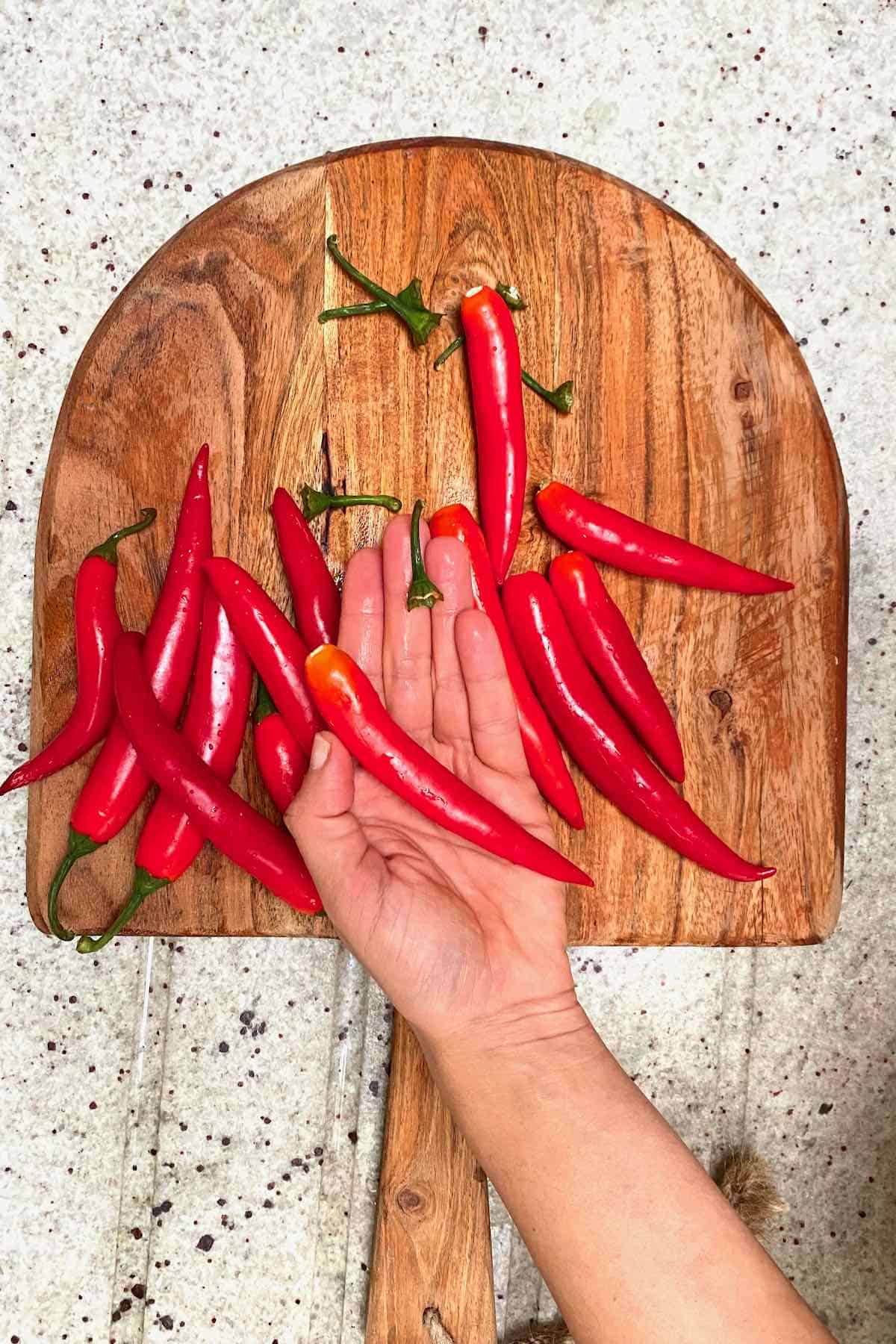
Next, roughly chop the peppers, keeping the seeds. You don’t need to be too precise with your chopping as everything will be blended.
Step 2: Blend the red chilli sauce
Add the peppers and the rest of the ingredients to a food processor or blender and blitz into a sauce.
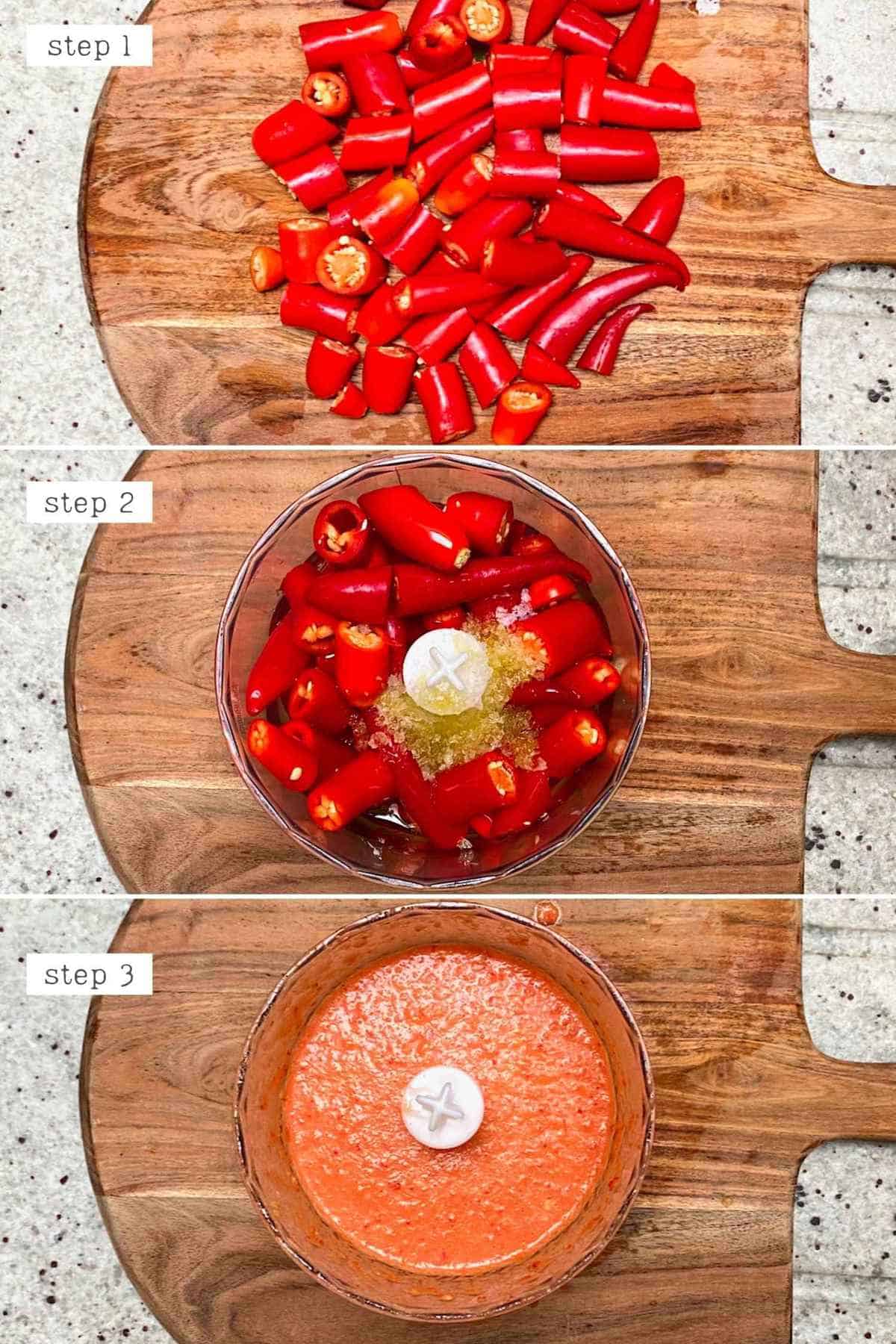
Taste the sauce and adjust seasonings as necessary.
Then, transfer the sauce to a sterilized jar and enjoy it immediately or store it in the fridge for longer-term storage.
Optionally, you can reduce this sauce down to thicken it slightly over a hob. Read the recipe notes for more on that.
How To Store
Store the homemade chili sauce in a glass jar (plastic will stain), for between 1 month in the fridge and for up to four months in the freezer.
If it begins to taste sour or moldy in any way (or has physical signs of mold), then discard it.
Also, you may be able to hot water bath can this red chili sauce (and then store it for months in the fridge) – however, it depends on its’ pH balance and using the correct method. If this is something you’d like to do, it’s best to consult reputable sources regarding canning items.
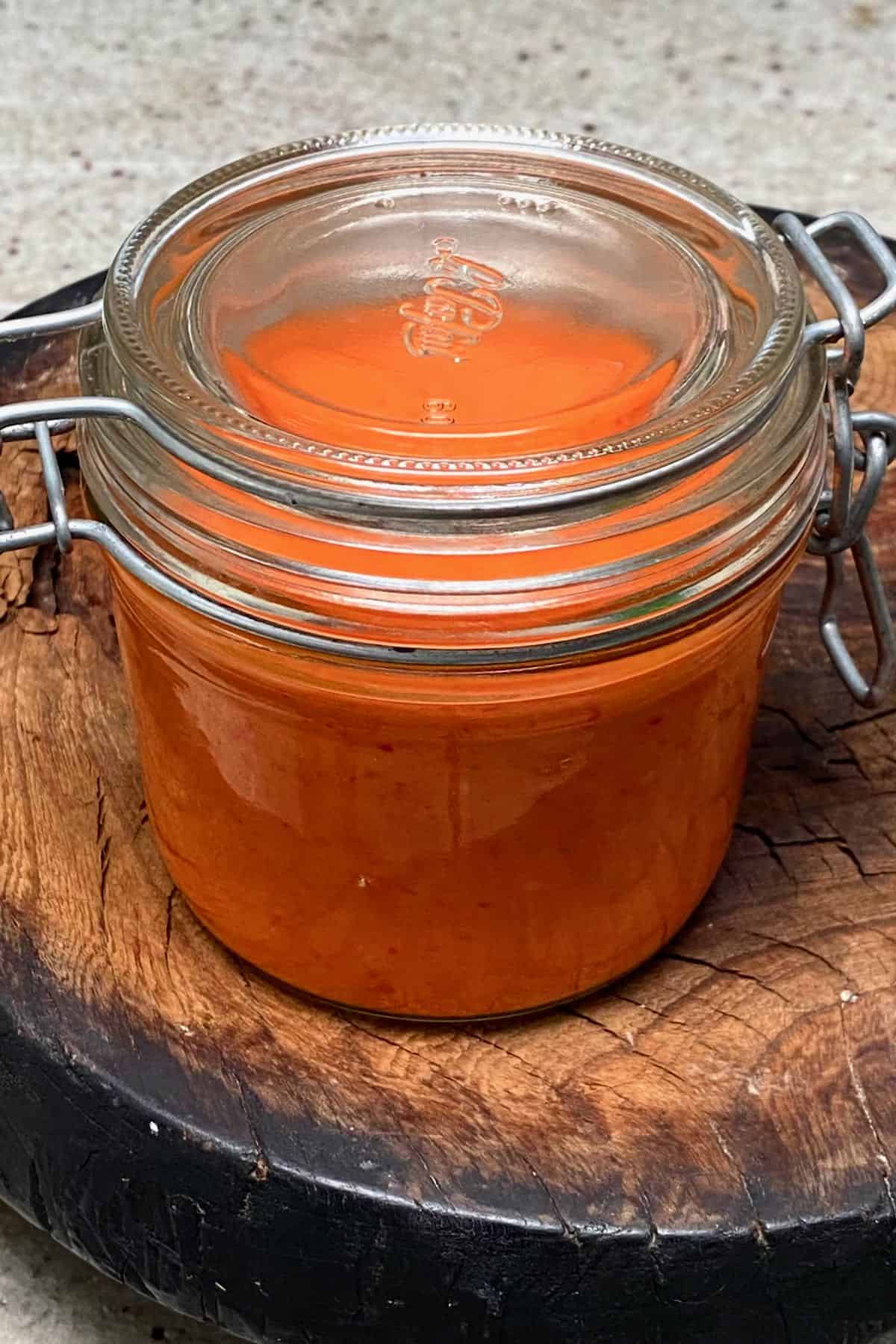
How To Use
Use this hot chili sauce anywhere you would a store-bought version.
- Slather over pita sandwiches
- Add to burgers – like this Sweet Potato Black Bean Burger (Plant-based Burger)
- Drizzle over fries (sweet potato or white potato) and nachos
- Use as a dip for finger foods and appetizers – like this tear and share cheesy bread or Fatayer (Lebanese spinach pies).
- Use as part of a marinade for proteins – like this homemade tofu.
- Add a little to tomato sauces (like this marinara) for extra heat and flavor.
Let me know in the comments below, what your favorite ways of using this hot chili sauce are!
Recipe Notes
- Make sure to use gloves when dealing with chilies – especially if you decide to remove the seeds. The chili remnants can remain on your skin for days causing burning (and if you touch your mouth/eyes – ouch!).
- Feel free to sieve the sauce before bottling it, if preferred. This is especially more for people who don’t have very powerful blenders/food processors and ended up with quite a chunky sauce (though even then you can leave it as-is if preferred).
- For an oil-free version, you could simply add a little water to help it blend. Though the resulting sauce won’t be quite as silky.
- For a thicker sauce, you can reduce it on a stovetop for some time at a gentle simmer (usually 20-30 minutes).
Related DIYs

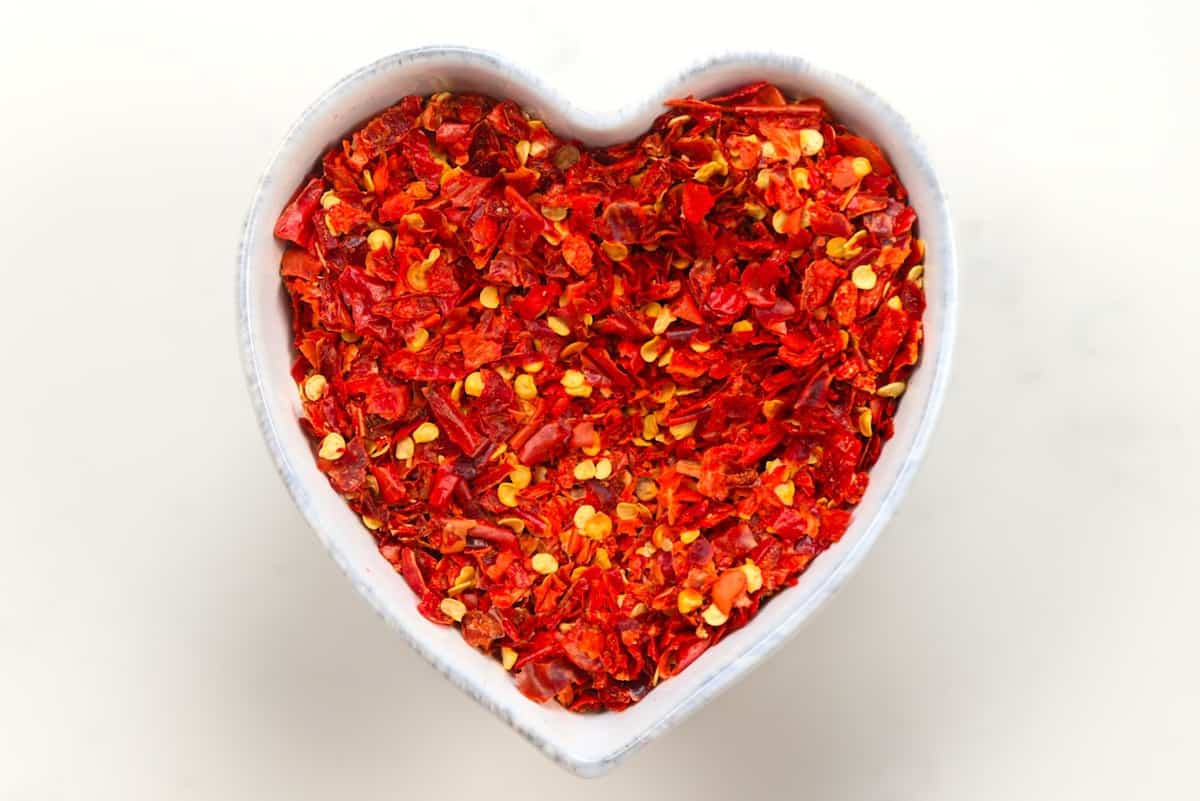
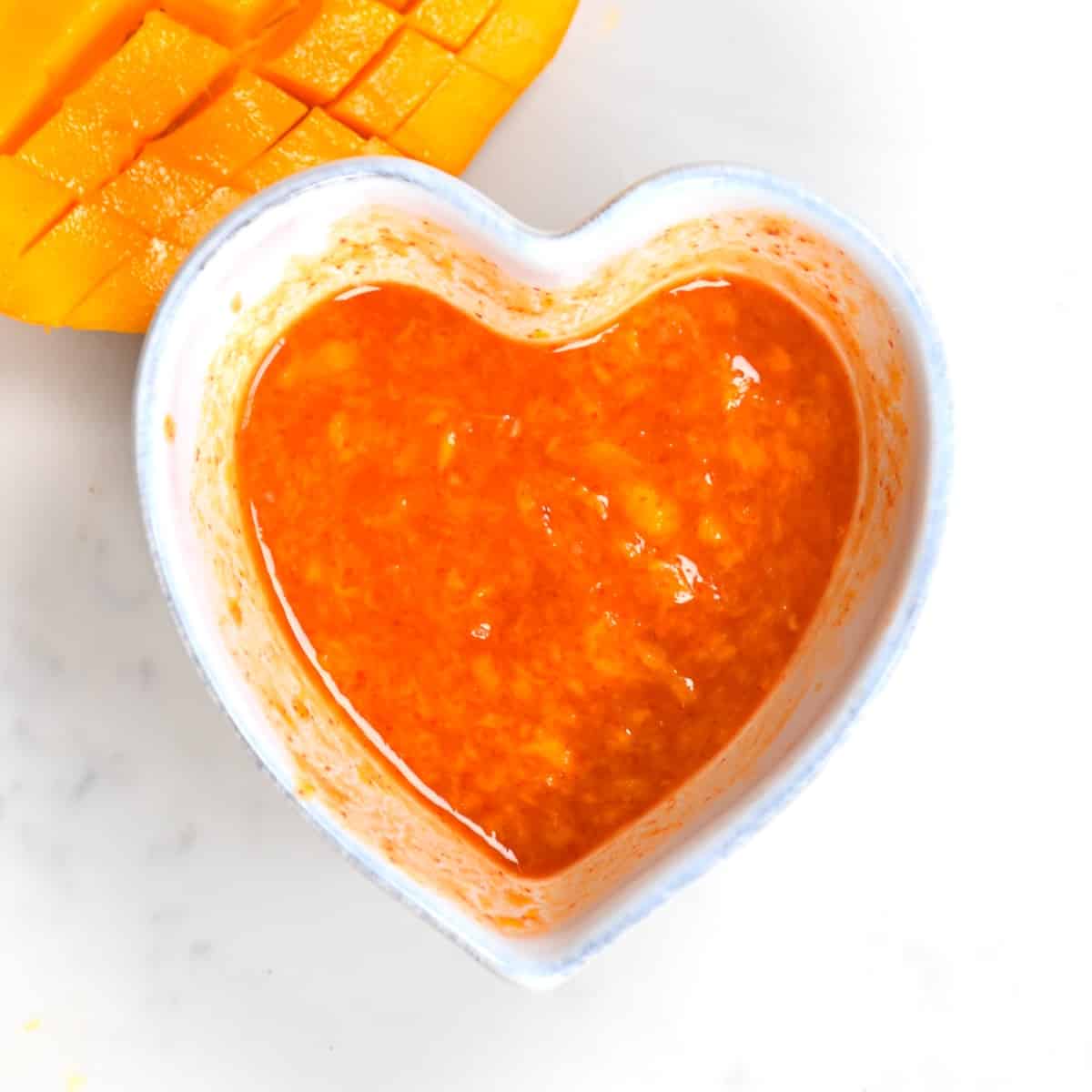
If you try this homemade chili sauce recipe, then let me know your thoughts and questions in the comments. I’d also really appreciate a recipe rating and would love to see your recreations – just tag @AlphaFoodie.
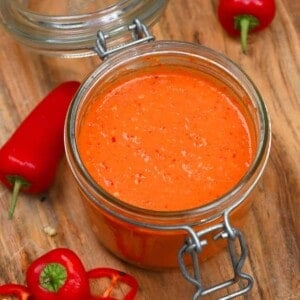
Simple Homemade Chili Sauce (Red Chili Sauce)
Ingredients
- 1 pound red chilies choose a variety based on the heat level you'd prefer (check notes)
- 2 Tbsp salt
- 1/3 cup olive oil
- 1/2 cup vinegar I used apple cider vinegar
- Sugar, just a pinch to taste (OPTIONAL) use granulated (raw, brown, etc.), natural syrup (maple, honey), or sugar-free like erythritol/swerve
Instructions
Step 1: Prepare the peppers
- First, wash the chili peppers, patting them dry with a little paper towel.
- Then, cut off the stem ( green tops). It's best to wear gloves and avoid touching your face while dealing with the chilies!
- Next, roughly chop the peppers, keeping the seeds. You don’t need to be too precise with your chopping as everything will be blended.
Step 2: Blend the red chilli sauce
- Add the peppers and the rest of the ingredients to a food processor or blender and blitz into a sauce.Taste the sauce and adjust seasonings as necessary.
- Then, transfer the sauce to a sterilized jar and enjoy it immediately or store it in the fridge for longer-term storage.Optionally, you can reduce this sauce down to thicken it slightly over a hob. Read the recipe notes for more on that.
How To Store
- Store the homemade chili sauce in a glass jar (plastic will stain), for up to 1 month in the fridge and for up to four months in the freezer.If it begins to taste sour or moldy in any way (or has physical signs of mold), then discard it.Also, you may be able to hot water bath can this red chili sauce (and then store it for months in the fridge) – however, it depends on its' pH balance and using the correct method. If this is something you'd like to do, it's best to consult reputable sources regarding canning items.
Notes
- Mild: Bell pepper (no heat), Friggitello, Anaheim
- Medium: Poblano, Guajillo
- Hot: Jalapeno, Chipotle, Serrano, Cayenne peppers
- Very Hot: Thai chili (also called Bird’s eye), Scotch Bonnet, Habanero
- SUPER Hot: Ghost pepper, Scorpion pepper.
- Make sure to use gloves when dealing with chilies – especially if you decide to remove the seeds. The chili remnants can remain on your skin for days causing burning (and if you touch your mouth/eyes – ouch!).
- Feel free to sieve the sauce before bottling it, if preferred. This is especially more for people who don’t have very powerful blenders/food processors and ended up with quite a chunky sauce (though even then you can leave it as-is if preferred).
- For an oil-free version, you could simply add a little water to help it blend. Though the resulting sauce won’t be quite as silky.
- For a thicker sauce, you can reduce it on a stovetop for some time at a gentle simmer (usually 20-30 minutes).
Read the optional add-ins section of the blog post above, for more ideas on what to add to this red chilli sauce recipe to jazz it up to your liking!
Nutrition
Nutrition information is automatically calculated, so should only be used as an approximation.

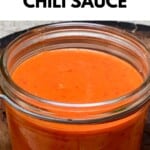



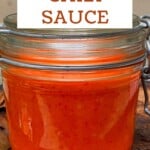









Just made the recipe. It is indeed very easy to make and delicious! As per personal taste I added some garlic gloves to it.
Hi Eric,
I’m glad that you liked the recipe and that you added some garlic to adjust it to your taste!
Made this using Splenda since I can’t have sugar. It turned out DELICIOUS!! Totally elevated my cheese quesadilla smeared on top of each bite. YUMMMM!!
Hey Holly! I’m so glad to hear you loved the chili sauce! Using Splenda is a great idea for keeping it sugar-free. Thanks so much for sharing your feedback
Hi,
my name is Ted, I’m 56yo, I’ve been a chilli freak for over 3 decades now (the hotter, the better), and I’ll try and keep my coment brief.
Until recently I’ve never tried to make chilli sauce but then a friend gave me a huge bag of home grown scotch bonnets. So I jumped on the web and after checking out a dozen other recipes (they all seemed too complex) I found this page and I will be forever grateful !! Thank you so very much.
Now that I’ve gotten that off my chest I wanted to share with you, and everybody else, a trick I learned recently.
If you hate using latex gloves when chopping chillies, like me, then the best way to get the chilli essencce off your hands is to wash them with hand sanitiser first then wash your hands as usual. I use an alcohol based one and to test it out I rubbed one eye after using it and absolutely no chilli burn whatsoever. I hope this helps others
Anyway, thank you again for this recipe and ‘May the Sauce Be with You’.
Ted.
Thank you for your comment and for your tips/tricks, Ted. I’m glad you like the recipe! 🙂
Hi.. ive stored this in bottle in fridge and used for year or so . No problem.
That’s amazing! Thanks for sharing, Mark.
absolutely loved this recipe, I found that the sauce lasted longer than a month going on 2 in the refrigerator and it tastes and smells the same, no mould, is that safe? I certainly look forward to more like these. thank you
Hi Shirley,
Thank you for your feedback, I’m glad you like the recipe. Just keep a close eye on it – as long as it doesn’t look or smell off, it should be fine.
Can you use dried red chillies instead of plump soft chillies for this recipe?
Hi Monique,
I haven’t tried it with this recipe but I’m sure you can. Let me know if you give it a try.
Thank you for sharing your diy recipe it is simple but a delicious one.
Thank you for your comment, Theda.
Quick and easy
Thank you for your comment, Elize
Can I use lemon instead of vinegar?
Yes, you can substitute.
I am a huge fan of you Samira 🙂 and you are the first cook I look up to for any recipe. I love how healthy and extremely colorful all your recipes are. You also seem to be a generous and kind person, thank you for sharing your insights to us all. I have learnt so much from you. I do not have a public page in Insta, but whenever I cook something from your recipe list, I make sure my friends know where to look for the recipe 🙂
I live in Japan and do not get spicy, fresh red chillies. But I found some not-spicy red ones that gave the exact color to which I added soaked “dry-red-spicy-Indian” chillies to make this sauce. Turned out good. I am going to be posting my reviews and thank you now to all the recipes of yours I have tried and enjoyed. Thank you once again 🙂
Thank you for your comment and your kind words, Janani. I am so happy you are trying and enjoying my recipes. It’s really encouraging to read your feedback 🙂
Would love to try your chilli sauce! I love your recipes Sameera and learnt a lot of good tips so thank you so much. How does one retain the strength of the red crushed chillies? i always end up adding more chillies to the dish as its lost its potency. Look forward to your reply. Take care
I’ve found that chili sauce will naturally change slightly in flavor over time, as the chilies within it age – sometimes this means getting milder, and sometimes they even become hotter. The only thing I can think to suggest off the top of my head is to make a batch with hotter peppers than you usually would and see how that is after a few days.